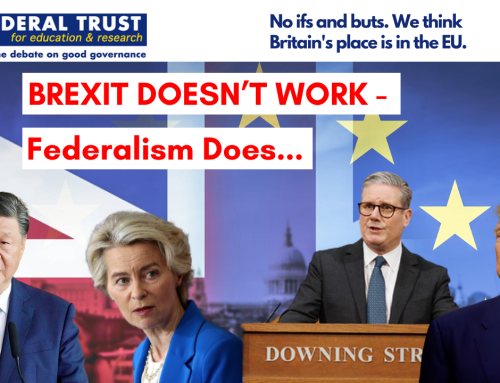By Bob Savic, Senior Research Fellow, Global Policy Institute and Corporate Advisory Partner with Petersburg Capital LLP
13th April 2018
As Theresa May’s Conservative government and the European Union prepare negotiating positions for a future post-Brexit relationship, the UK’s financial services trade with the EU’s Single Market looks set to become a key battleground in upcoming talks. Alongside Brexit negotiations, the European Commission has announced its intentions to complete a Capital Market Union that will support a deepening and diversification of financial services for the remaining 27 member states shortly following Brexit, in 2019.
EU’s opening FTA agenda offers minimal access for UK trade in services
On March 7th, the European Council President, Donald Tusk, fired the first salvo on upcoming negotiations with draft Brexit guidelines laying out the EU’s agenda in establishing a free trade agreement (FTA). The key sectors to be covered include trade in goods with zero tariffs and no quantitative restrictions, customs cooperation, investment, access to public procurement markets, protection of intellectual property, among other areas including the recent media-reported controversy over reciprocal access to fishing waters.
As far as trade in services were concerned the draft guidelines stated that market access will only be enabled under “host state rules”. In other words, the UK’s services trade with the EU single market will be limited to the bloc’s existing provisions with third countries (i.e. non-EU members) – emphasising the two sides will no longer share a common regulator or judicial framework. Accordingly, the EU’s services engagement with third countries is carried out through a system of “mutual equivalence”. This framework allows for recognition of regulations governing certain services, including banking and finance, by the EU and a non-member state. However, the UK government has dismissed applying the EU’s mutual equivalence framework arguing that the European Commission’s equivalence decisions are not comprehensive enough, providing either partial and/or temporary coverage of service industries. Any equivalence decision may also be subject to Brussels’ arbitrary unilateral withdrawal.
Additionally, the EU’s draft guidelines offer no prospect of discussing so-called “innovative” arrangements, effectively brushing aside May’s recent proposals for mutual recognition of regulatory standards governing trade in services. Even more ominously, there was no mention of financial services, thereby seemingly disregarding Philip Hammond’s calls for a bespoke deal in this area. The EU’s chief negotiator, Michel Barnier, even hammered home the point stating that no single trade agreement existed that was open to financial services.
Clearly, the absence of services coverage in the EU’s draft guidelines means there could be a lot at stake for the City of London, and the UK as a whole, should trade in services not be included within an FTA. The scale of importance of financial services for the UK economy can be evidenced from the most complete data available in 2016, when the nation’s services exports to the EU topped £100bn. London’s share of the total was £47 billion, including about £37bn in financial and banking services, and roughly £10bn in legal, accounting and other professional services.
Given the economic benefits at least several of the remaining EU states may derive from developing financial services for the single market, in the wake of Britain’s possible exclusion in this sector, it’s hardly surprising that only a day after the EU’s draft guidelines were released, the European Commission announced, on March 8th, a raft of new measures designed to complete an EU Capital Markets Union (CMU) by mid-2019.
What is Capital Market Union and how does it pose a challenge to UK financial services?
CMU has been devised to create a level playing field across the EU’s member states by equating the conditions that a financial institution experiences in its host state with those of its home state. The purpose, therefore, is to enable financial service providers, having similar business size and risk profiles, to be subject to the same standards of supervision regardless of where they are located in the EU.
In the European Commission’s Mid-term Review of June 2017, regarding progress already made on CMU, it stated that recent developments in the EU’s political and economic context require a strong and competitive capital market to finance the EU economy, alongside the Banking Union. Significantly, the Commission’s paper added that the “future departure of the largest financial centre from the EU makes it necessary to re-assess how CMU can ensure that EU businesses and investors have strong, dynamic and more integrated capital markets”.
To this end, the Commission believes deeper capital markets will be needed to provide new sources of corporate financing and support for increasing investment options. This should enable EU firms ranging from start-ups to multinationals to access a wide range of funding sources to invest in innovation and company expansion. It should also allow households greater access to capital markets in order to benefit from more diverse and higher quality opportunities for investment.
Preparing for Brexit
The European Commission’s communication on March 8th stated that the departure of the UK from the single market reinforces the urgent need to further strengthen and integrate the EU capital market framework, including on central counterparties, investment firms and markets for initial public offerings. It also reiterated the need for further integration of financial services supervision at the EU level.
The respective measures to be put into place in achieving these objectives will “constitute the basis for a decisive and lasting laying of foundations for a true CMU by 2019”, according to the Commission. These include its commitments in setting up eight CMU building blocks by mid-2019. While three have already been enacted by the European Parliament and European Council, the others have yet to be adopted, including those announced on March 8th. These included promotion of covered bonds as long term finance arrangements, boosting the cross border distribution of investment funds, facilitating the financing of sustainable economic growth, and enabling crowd funding service providers to establish a more competitive and innovative European financial sector.
The Commission’s positive message of embedding a level playing field for EU-based financial services, through CMU, was in stark contrast to a joint report issued on April 12th, from the EU’s banking, insurance and market regulators on the risks of Brexit to the bloc’s financial system. This stated that Brexit may affect the access of EU companies and households to financial services supplied out of the UK. “Contingency planning should consider timely responses to all potential challenges, such as contract continuity and possible relocations”, it said.
The report further added that UK-based banks, insurers, market infrastructure entities and asset managers should push ahead with applications for licenses, to set up in the EU, in advance of next year’s Brexit deadline. This way, such organisations would avoid their customers being cut off from financial services outside the single market.
What the future may hold
CMU poses a long-term competitive challenge to the UK’s financial services sector in the EU single market, post Brexit, notwithstanding the likely difficulties the UK faces in upcoming FTA negotiations to include trade in financial and other services.
This is not to say that the Commission will not experience resistance from the EU’s Council and Parliament in its ambitions to complete CMU by mid-2019. Over the last few years, these co-legislative bodies’ deliberations over the Commission’s proposed CMU building blocks have often been deadlocked, and without any clear road ahead in some cases.
Conversely, of course, the rich spoils to be won from Brexit, for several EU states looking to beef up their financial services offerings, may be the galvanising tonic the Commission had long been hoping for in securing successful passage of CMU.






